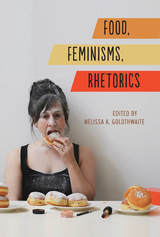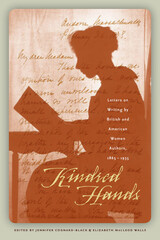3 books about Cognard-Black, Jennifer

Food, Feminisms, Rhetorics
Edited by Melissa A. Goldthwaite
Southern Illinois University Press, 2017
Inspired by the need for interpretations and critiques of the varied messages surrounding what and how we eat, Food, Feminisms, Rhetorics collects eighteen essays that demonstrate the importance of food and food-related practices as sites of scholarly study, particularly from feminist rhetorical perspectives.
Contributors analyze messages about food and bodies—from what a person watches and reads to where that person shops—taken from sources mundane and literary, personal and cultural. This collection begins with analyses of the historical, cultural, and political implications of cookbooks and recipes; explores definitions of feminist food writing; and ends with a focus on bodies and cultures—both self-representations and representations of others for particular rhetorical purposes. The genres, objects, and practices contributors study are varied—from cookbooks to genre fiction, from blogs to food systems, from product packaging to paintings—but the overall message is the same: food and its associated practices are worthy of scholarly attention.
Contributors analyze messages about food and bodies—from what a person watches and reads to where that person shops—taken from sources mundane and literary, personal and cultural. This collection begins with analyses of the historical, cultural, and political implications of cookbooks and recipes; explores definitions of feminist food writing; and ends with a focus on bodies and cultures—both self-representations and representations of others for particular rhetorical purposes. The genres, objects, and practices contributors study are varied—from cookbooks to genre fiction, from blogs to food systems, from product packaging to paintings—but the overall message is the same: food and its associated practices are worthy of scholarly attention.
[more]

From Curlers to Chainsaws
Women and Their Machines
Joyce Dyer
Michigan State University Press, 2016
The twenty-three distinguished writers included in From Curlers to Chainsaws: Women and Their Machines invite machines into their lives and onto the page. In every room and landscape these writers occupy, gadgets that both stir and stymie may be found: a Singer sewing machine, a stove, a gun, a vibrator, a prosthetic limb, a tractor, a Dodge Dart, a microphone, a smartphone, a stapler, a No. 1 pencil and, of course, a curling iron and a chainsaw.
From Curlers to Chainsaws is a groundbreaking collection of lyrical and illuminating essays about the serious, silly, seductive, and sometimes sorrowful relationships between women and their machines. This collection explores in depth objects we sometimes take for granted, focusing not only on their functions but also on their powers to inform identity.
For each writer, the device moves beyond the functional to become a symbolic extension of the writer’s own mind—altering and deepening each woman’s concept of herself.
From Curlers to Chainsaws is a groundbreaking collection of lyrical and illuminating essays about the serious, silly, seductive, and sometimes sorrowful relationships between women and their machines. This collection explores in depth objects we sometimes take for granted, focusing not only on their functions but also on their powers to inform identity.
For each writer, the device moves beyond the functional to become a symbolic extension of the writer’s own mind—altering and deepening each woman’s concept of herself.
[more]

Kindred Hands
Letters on Writing by British and American Women Authors, 1865-1935
Jennifer Cognard-Black
University of Iowa Press, 2006
Kindred Hands, a collection of previously unpublished letters by women writers, explores the act and art of writing from diverse perspectives and experiences. The letters illuminate such issues as authorship, aesthetics, collaboration, inspiration, and authorial intent. By focusing on letters that deal with authorship, the editors reveal a multiplicity of perspectives on female authorship that would otherwise require visits to archives and special collections.Representing some of the most important female writers of the nineteenth and early twentieth centuries, including transatlantic correspondents, women of color, canonical writers, regional writers, and women living in the British empire, Kindred Hands will enliven scholarship on a host of topics, including reception theory, feminist studies, social history, composition theory, modernism, and nineteenth-century studies. Moreover, because it represents previously unpublished primary sources, the collection will initiate new discussions on race, class, sexuality, ethnicity, and gender with an eye to writing at the turn of the twentieth century.The WritersMary Elizabeth Braddon, Mary Cholmondeley, Mary Chavelita Dunne Bright [George Egerton], Rhoda Broughton, Marie Corelli, Rebecca Harding Davis, Mary Abigail Dodge [Gail Hamilton], Jessie Redmon Fauset, Frances Ellen Watkins Harper, Mary St. Leger Kingsley Harrison [Lucas Malet], Annesley Kenealy, Palma Pederson, Elizabeth Stuart Phelps, Henrietta Stannard, Harriet Beecher Stowe, Rosamund Marriott Watson [Graham R. Tomson]
[more]
READERS
Browse our collection.
PUBLISHERS
See BiblioVault's publisher services.
STUDENT SERVICES
Files for college accessibility offices.
UChicago Accessibility Resources
home | accessibility | search | about | contact us
BiblioVault ® 2001 - 2024
The University of Chicago Press









